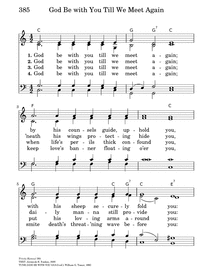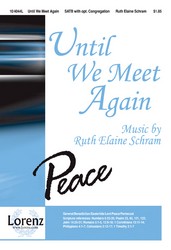- |
User Links
God Be with You Till We Meet Again

God be with you till we meet again
Author: Jeremiah Eames Rankin (1880)Tune: GOD BE WITH YOU
Benediction
Published in 1194 hymnals
Printable scores: PDF, MusicXMLAudio files: MIDI, Recording
Representative Text
1 God be with you till we meet again;
loving counsels guide, uphold you,
may the Shepherd’s care enfold you;
God be with you till we meet again.
Refrain:
Till we meet, till we meet,
till we meet at Jesus’ feet.
Till we meet, till we meet,
God be with you till we meet again.
2 God be with you till we meet again;
unseen wings, protecting, hide you,
daily manna still provide you;
God be with you till we meet again. [Refrain]
3 God be with you till we meet again;
when life’s perils thick confound you,
put unfailing arms around you;
God be with you till we meet again. [Refrain]
4 God be with you till we meet again;
keep love’s banner floating o’er you,
smite death’s threat’ning wave before you;
God be with you till we meet again. [Refrain]
Source: Voices Together #840
Author: Jeremiah Eames Rankin
 Pseudonym: R. E. Jeremy.
Rankin, Jeremiah Eames, D.D., was born at Thornton, New Haven, Jan. 2, 1828, and educated at Middleburg College, Vermont, and at Andover. For two years he resided at Potsdam, U.S. Subsequently he held pastoral charges as a Congregational Minister at New York, St. Albans, Charlestown, Washington ( District of Columbia), &c. In 1878 he edited the Gospel Temperance Hymnal, and later the Gospel Bells. His hymns appeared in these collections, and in D. E. Jones's Songs of the New Life, 1869. His best known hymn is "Labouring and heavy laden" (Seeking Christ). This was "written [in 1855] for a sister who was an inquirer," was first printed in the Boston Recorder, and then included in Nason's Congregational Hymn Book,… Go to person page >
Pseudonym: R. E. Jeremy.
Rankin, Jeremiah Eames, D.D., was born at Thornton, New Haven, Jan. 2, 1828, and educated at Middleburg College, Vermont, and at Andover. For two years he resided at Potsdam, U.S. Subsequently he held pastoral charges as a Congregational Minister at New York, St. Albans, Charlestown, Washington ( District of Columbia), &c. In 1878 he edited the Gospel Temperance Hymnal, and later the Gospel Bells. His hymns appeared in these collections, and in D. E. Jones's Songs of the New Life, 1869. His best known hymn is "Labouring and heavy laden" (Seeking Christ). This was "written [in 1855] for a sister who was an inquirer," was first printed in the Boston Recorder, and then included in Nason's Congregational Hymn Book,… Go to person page >Text Information
Related Texts
| First Line: | God be with you till we meet again |
| Title: | God Be with You Till We Meet Again |
| Author: | Jeremiah Eames Rankin (1880) |
| Meter: | 9.8.8.9 with refrain |
| Language: | English |
| Refrain First Line: | Till we meet, till we meet |
| Notes: | German translation: See Gott sei mit euch bis zum wiedersehn, Seine Gnade euch geliete" by F. A. Willman, "Gott sei mit euch bis zum Wiedersehn! Mög Er freundlich euch regieren", "Gott sei mit euch bis zum wiedersehn, Sein Erbarmen seine Güte" by C. Hanser; Spanish translation: See "Dios os guarde en su santo amor" by Pierre Aguirre de la Barrera; Swahili translation: See "Mungu awe nanyi daima" |
| Copyright: | Public Domain |
| Liturgical Use: | Benediction |
- (hymns)
- (hymns)
- (hymns)
- (hymns)
- (hymns)
- (hymns)
- (hymns)
- (hymns)
- (hymns)
- (hymns)
- (hymns)
- (hymns)
- (hymns)
- (hymns)
- (hymns)
- (hymns)
- (hymns)
- (hymns)
- (hymns)
- (hymns)
- (hymns)
- (hymns)
- (hymns)
- (hymns)
- (hymns)
- (hymns)
- (hymns)
- (hymns)
- (hymns)
- (hymns)
- (hymns)
- (hymns)
- (hymns)
- (hymns)
- (hymns)
- (hymns)
- (hymns)
- (hymns)
- (hymns)
- (hymns)
- (hymns)
- (hymns)
- (hymns)
- (hymns)
- (hymns)
- (hymns)
- (hymns)
- (hymns)
- (hymns)
- (hymns)
- (hymns)
- (hymns)
- (hymns)
- (hymns)
- Year A, Christmas season, Holy Name of Jesus (Mary, Mother of God)
- Year A, Ordinary Time, Proper 4 (9)
This is recommended for Year A, Ordinary Time, Proper 4 (9) by 2 hymnal lectionary indexes including Glory to God: the Presbyterian Hymnal #541. - Year A, Ordinary Time, Proper 20 (25)
- Year B, Christmas season, Holy Name of Jesus (Mary, Mother of God)
- Year B, Ordinary Time, Proper 14 (19)
This is recommended for Year B, Ordinary Time, Proper 14 (19) by 2 hymnal lectionary indexes including Glory to God: the Presbyterian Hymnal #541 and Lift Up Your Hearts: psalms, hymns, and spiritual songs #944. - Year B, Ordinary Time, Proper 16 (21)
This is recommended for Year B, Ordinary Time, Proper 16 (21) by 2 hymnal lectionary indexes including Glory to God: the Presbyterian Hymnal #541 and Lift Up Your Hearts: psalms, hymns, and spiritual songs #944. - Year C, Christmas season, Holy Name of Jesus (Mary, Mother of God)
English
- A Calendar of Hymns #d17
- A choice collection of popular songs with some standard hymns for young people's meetings (Silver and Gold No. 1) #d37
- A Hymnal for Joyous Youth: An all-purpose hymnal for church, young peoples' services and Sunday schools #24
- A Messenger for Jesus #d62
- A Missionary Hymn Book #159
- A Service Hymn Book #d36
- A Treasury of Hymns: The best-loved hymns, carols, anthems, children's hymns, and gospel songs #352
- A. M. E. C. Hymnal #444
- A.M.E. Hymnal: with responsive scripture readings...(The Richard Allen A.M.E. Hymnal) #d109
- Abiding Faith #154 10 shown out of 906
Hebrew
Korean
Welsh
- Cân a Mawl: llyfr hymna a thonau Methodistiaid Calfinaidd Unol Dalaethau yr America=Song and Praise: the hymnal of the Calvinistic Methodist Church of the United States of America #279
- Hymnau a thonau at wasanaeth amrywiol gyfarfodydd y cysegr #361
- Mawl a chân = praise and song : llyfr hymnau a thonau i Gymru ar Wasgar = hymnal for Welsh and English church worship / crynhoad pwyllgor Eglwys Gymraeg, Detroit, Michigan #310
- Welsh and English Hymns and Anthems #117
Yiddish
Notes
Scripture References:
st. 1 = Acts 20:32
st. 3 = Deut. 33:27
st. 4 = Songs of Songs 2:4
Jeremiah E. Rankin (b. Thornton, NH, 1828; d. Cleveland, OH, 1904) says of his hymn text,
It was written as a Christian good-bye; it was called forth by no person or occasion, but was deliberately composed as a Christian hymn on the basis of the etymology of "good-bye," which means "God be with you." The first stanza was sent to two different composers, one of musical note, the other [William G. Tomer] wholly unknown and not thoroughly educated in music. I selected the composition of the latter, and with some slight changes it was published.
The first stanza was published in 1880 with the tune GOD BE WITH YOU by William G. Tomer in Gospel Bells; the 1883 edition of that hymnal included eight stanzas. A popular hymn, "God Be with You" gained currency through the evangelistic crusades of Dwight L. Moody and Ira D. Sankey (PHH 73). Modern hymnals usually print only four stanzas.
The text is essentially a parting blessing, a prayer that God will guide you (st. 1), feed you (st. 2), and protect you in life and in death (st. 3-4). Each stanza is framed by the phrase "God be with you till we meet again."
A graduate of Middlebury College, Vermont, and of Andover Theological Seminary, Newton Center, Massachusetts, Rankin served Congregational churches in New York, Vermont, Massachusetts, Washington, D.C., and New Jersey (1855-1889). In 1889 he became president of Howard University, Washington, D.C., a school famous for its many prominent African American graduates. Rankin issued three volumes of poetry and hymn texts (of which "God Be with You" is his most well-known), collaborated in the compilation of hymnals such as The Gospel Temperance Hymnal (1878) and Gospel Bells (1880), and published German-English Lyrics, Sacred and Secular (1897).
Liturgical Use:
Though traditionally used when ministers, missionaries, or others take their leave from a congregation, this hymn is generally useful as a dismissal hymn, as a prayer for blessing, and as a sung benediction.
--Psalter Hymnal Handbook
Timeline
Arrangements
Media
The Book of Common Praise: being the hymn book of The Church of England in Canada (revised 1938) #304b
- MusicXML (XML)
Timeless Truths #112
- God_Be_with_You_till_We_Meet_Again.pdf (PDF)
The United Methodist Hymnal #672
The United Methodist Hymnal #673
- MIDI file from The Book of Common Praise: being the hymn book of The Church of England in Canada (revised 1938) #304b
- MIDI file from The Cyber Hymnal #1708
- Audio recording from Evangelical Lutheran Worship #536
- Audio recording from Glory to God: the Presbyterian Hymnal #541
- Audio recording from Glory to God: the Presbyterian Hymnal #542
- Audio recording from Lift Up Your Hearts: psalms, hymns, and spiritual songs #943
- Audio recording from Lift Up Your Hearts: psalms, hymns, and spiritual songs #944
- MIDI file from Psalter Hymnal (Gray) #316
- Audio recording from Revival Hymns and Choruses #79
- Audio recording from Small Church Music #471
- Audio recording from Small Church Music #471
- Audio recording from Small Church Music #471
- Audio recording from Trinity Hymnal (Rev. ed.) #385
- Audio recording from Trinity Hymnal (Rev. ed.) #386
- MIDI file from Timeless Truths #112
- Audio recording from The Worshiping Church #839
- Audio recording from The Worshiping Church #840
- MIDI file from The United Methodist Hymnal #672
- MIDI file from The United Methodist Hymnal #673
- Audio recording from The United Methodist Hymnal #673
- MIDI file from Worship and Rejoice #716
- MIDI file from With Heart and Voice: songs for all God's children #67


 My Starred Hymns
My Starred Hymns






